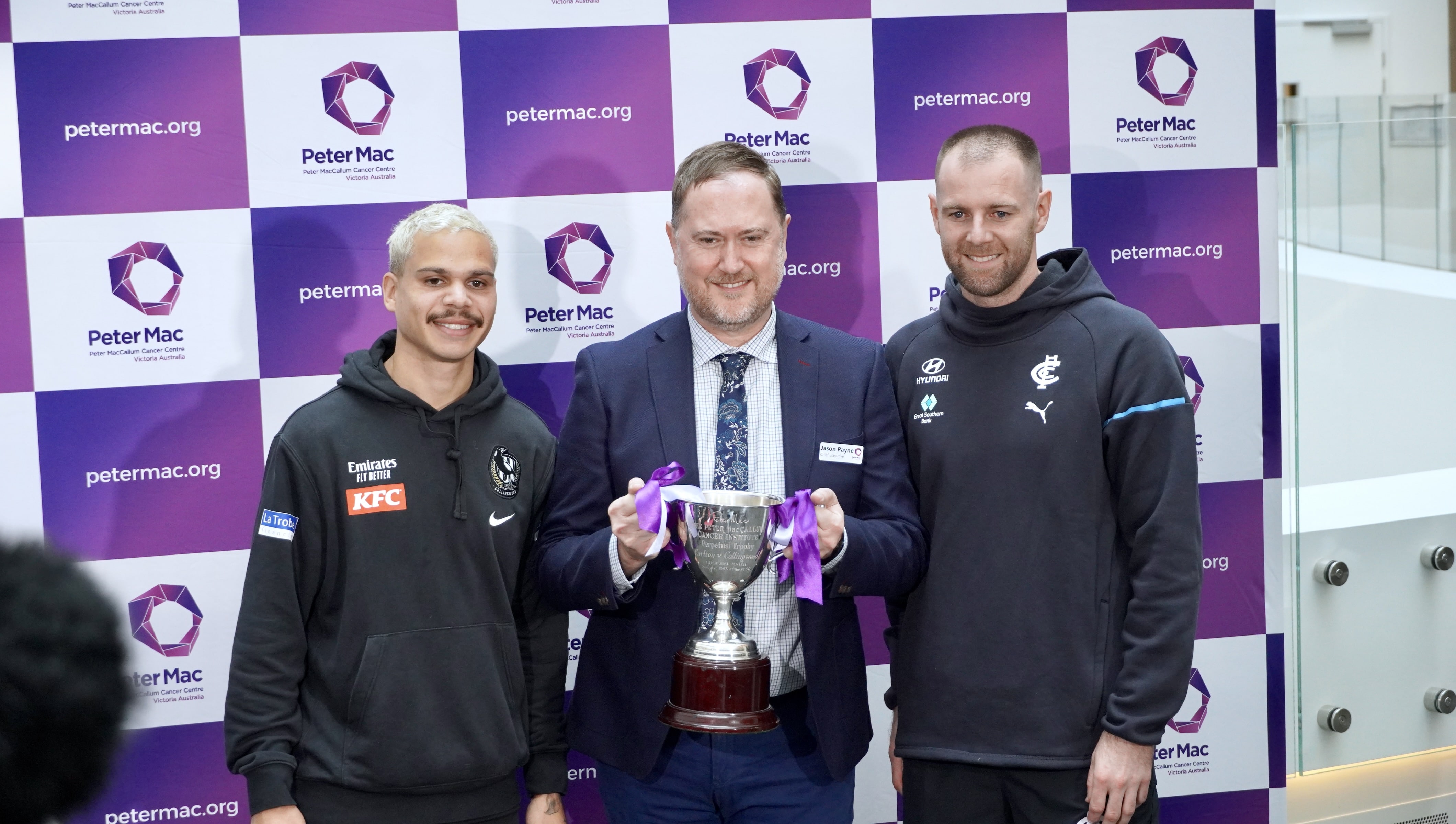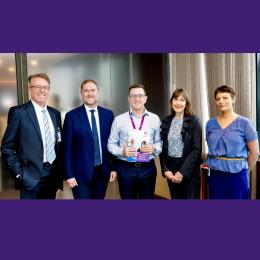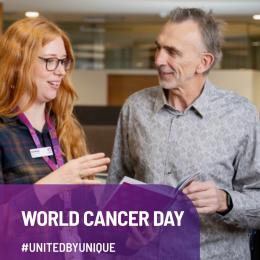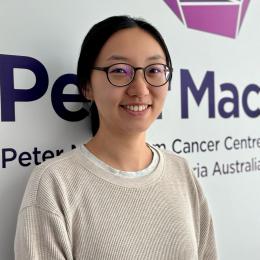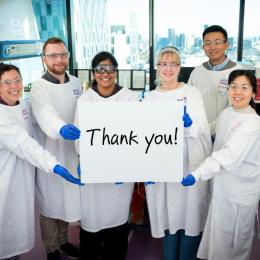Chris's story
7 min read 27 May 2023
In 2019, Chris’s life was turned upside down when he received a startling cancer diagnosis. But thanks to the collective efforts of clinicians at the Royal Melbourne Hospital and researchers from Peter Mac, he’s been given the gift of time that’s allowed him to capture more magical memories with his loved ones.
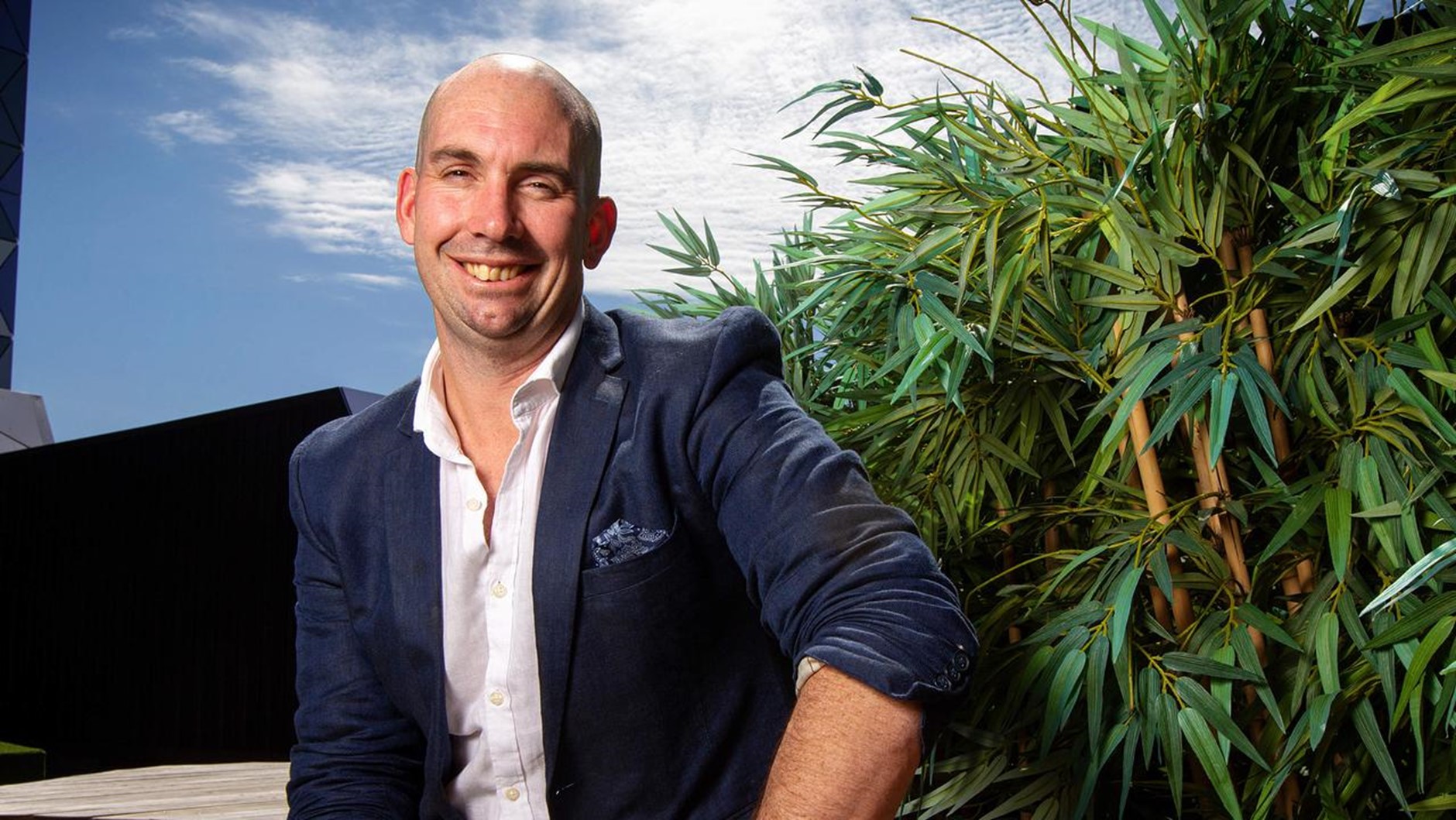
Chris, 38, is a father, husband and barrister who suddenly became sick with an exceptionally rare form of cancer. [Photo credit: Mark Stewart]
As he lay in a medical scanner, Chris rehearsed the words for a video to be played at his funeral, knowing he would be dead within days.
Over 90 minutes, the machine took pictures of incurable tumours throughout his heavily bruised, cancer-riddled body, before Chris was free to go to the Peter Mac rooftop to spend precious time with his wife, Kath.
They were soon disturbed by one of the dozens of specialists trying to make sense of his extraordinary case, demanding he come to an urgent meeting in his room.
There were five doctors in the room. They told him the medication was working.
“They said that I might see November", Chris said. "I might see December, I might see Christmas … then I just lost it, I was shaking with my head in my hands.
Two hours ago I was laying in a PET scan planning my funeral and wanting to get this video done to now being told, ‘You can potentially go home tomorrow.’
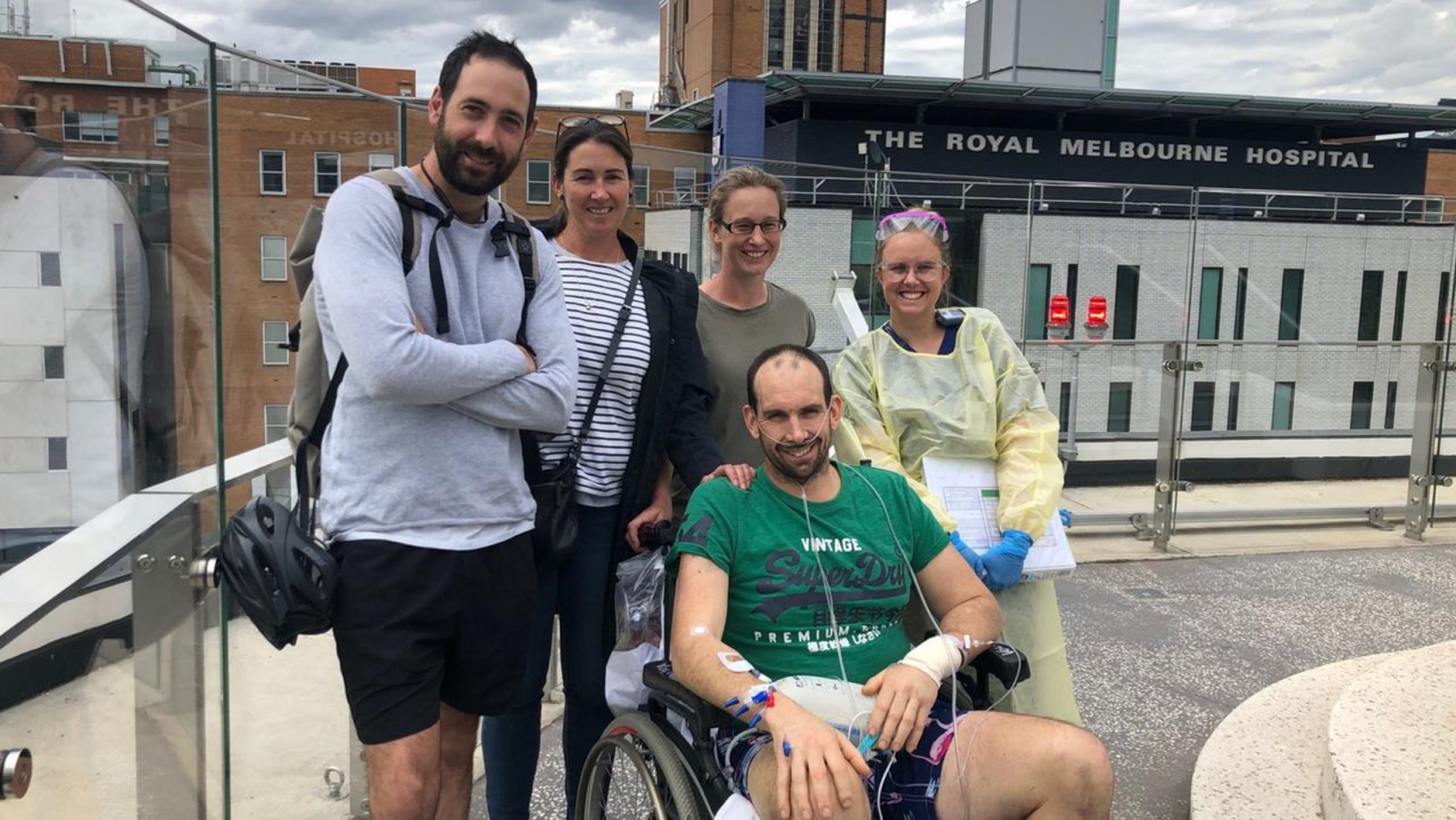
Chris with nurse, Amy, and his loved ones, snapped on the rooftop terrace at Peter Mac.
A devastating diagnosis
A month earlier, Chris had taken sons Miles, 9, and Tom, 6, camping and thought he was in peak fitness starting a new basketball season. But as he struggled to keep pace with mates on the court, he wondered if something was wrong. When he saw blood in his urine after the game, he knew it.
After a late-night trip to his local emergency department, CT scans revealed cancer on Chris’s liver, lungs and pelvis, and he was sent to the Royal Melbourne Hospital for more tests.
When he returned to the RMH days later, doctors were so alarmed by the results of a PET scan, they cancelled any further tests.
Mystery tumours riddled Chris’s body.
Worse, the scans showed bruising and internal bleeding everywhere — any medical procedure would cause massive haemorrhaging and risked killing Chris.
Bruising began to show on Chris’s back and all over his legs, so he was admitted to hospital and received the first of more than 330 blood transfusions and blood products.
As his condition rapidly deteriorated, the best medical minds realised Chris had only a matter of days, or even hours, left.
Whatever the disease was, it had triggered a condition called Desseminated Intravascular Coagulation — or DIC — an inflammatory reaction sucking up all the platelets and coagulation factors in Chris’s blood, causing internal bleeding.


Chris’s bruising was a result of internal haemorrhage due to Desseminated Intravascular Coagulation.
Haunting goodbyes
Aware Chris probably only had hours to live, Miles and Tom were rushed to the hospital for a hurried goodbye as he was moved to the Intensive Care Unit.
“It was horrible. The fear in Tom’s eyes is seared into my mind,” Chris said. “I sat down on the bed and then they just started plugging all this stuff on to me. I was a bit surprised at what was going on.”
As Chris lay in intensive care, a keen-eyed pathologist noticed a tiny lump on his neck appearing in scans that was not near any major bleed.
A sample of the lump could have been enough to work out what the tumours were — but the procedure to remove it was so dangerous that Chris was given the option of foregoing it to instead spend his remaining hours with his kids.
“I was freaking out. I had a real fear of dying, but my greatest fear was that this was the last time the kids would see me. I could see some appeal for spending 24 hours with them.
The kids were there and I said goodbye to them again. That is the one that haunts me, I genuinely believed it was the last time I was saying goodbye to them.
A sample was expected to show one of three things: lymphoma, which might be treatable; melanoma, which would offer a slight hope; or cholangiocarcinoma, a bile duct cancer that has no treatment and is effectively a death sentence.
Using a large needle, and with Chris awake, a radiologist pulled a sample before anatomical pathologist, Dr Anand Murugasu, placed it on a slide under a microscope.
“What I saw was exactly what I did not want to see,” Dr Murugasu said.
“As soon as we stuck the needle in and looked at the needle and saw, I thought, ‘This is not lymphoma, it is really unlikely to be melanoma and they’ve said there is nothing in the lung — we are going to have to get the palliative care team.’”
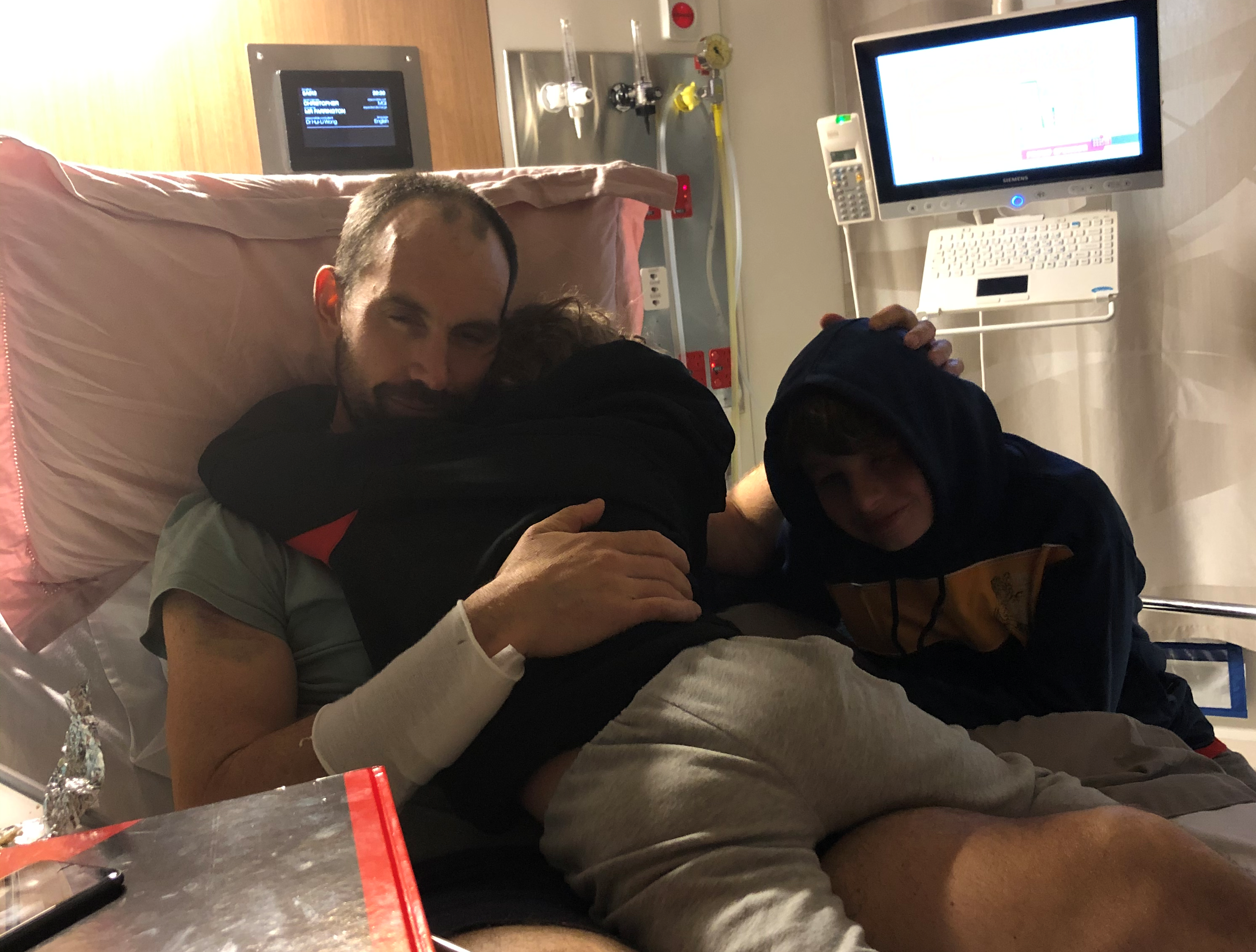
A breakthrough, and a beacon of hope
Told it was cholangiocarcinoma, Chris and Kath knew he had at best months to live, though with DIC it was most likely days.
“I said to Kath repeatedly I didn’t want to be that person who came into hospital and never left. By that stage it was pretty obvious to me that is what was going to happen.”
Although there was no chance of it saving his life, the collaboration with Peter Mac began chemotherapy in the hope of slowing the bleeding to buy some time.
But unknown to the couple, heartbroken to see a young father with his family but little hope, Chris’s team of doctors decided they needed to keep trying. The pathologists continued to rush tests on the sample trying to find genetic mutations that more common in other types of cancer.
Blood samples sent to the US also confirmed the tumours were cholangiocarcinoma but, somehow, Chris’s tumours carried the same mutation found in some lung cancers.
Remarkably, that exact mutation — found on the ALK gene — is targeted by new-generation lung cancer drug. While Chris may not have had lung cancer, there was a chance the same drug might be useful for his cancer.
Although the odds of finding a treatment that Chris’s cancer would respond to were described as less than one in a million, they had found a drug that at least offered some hope.
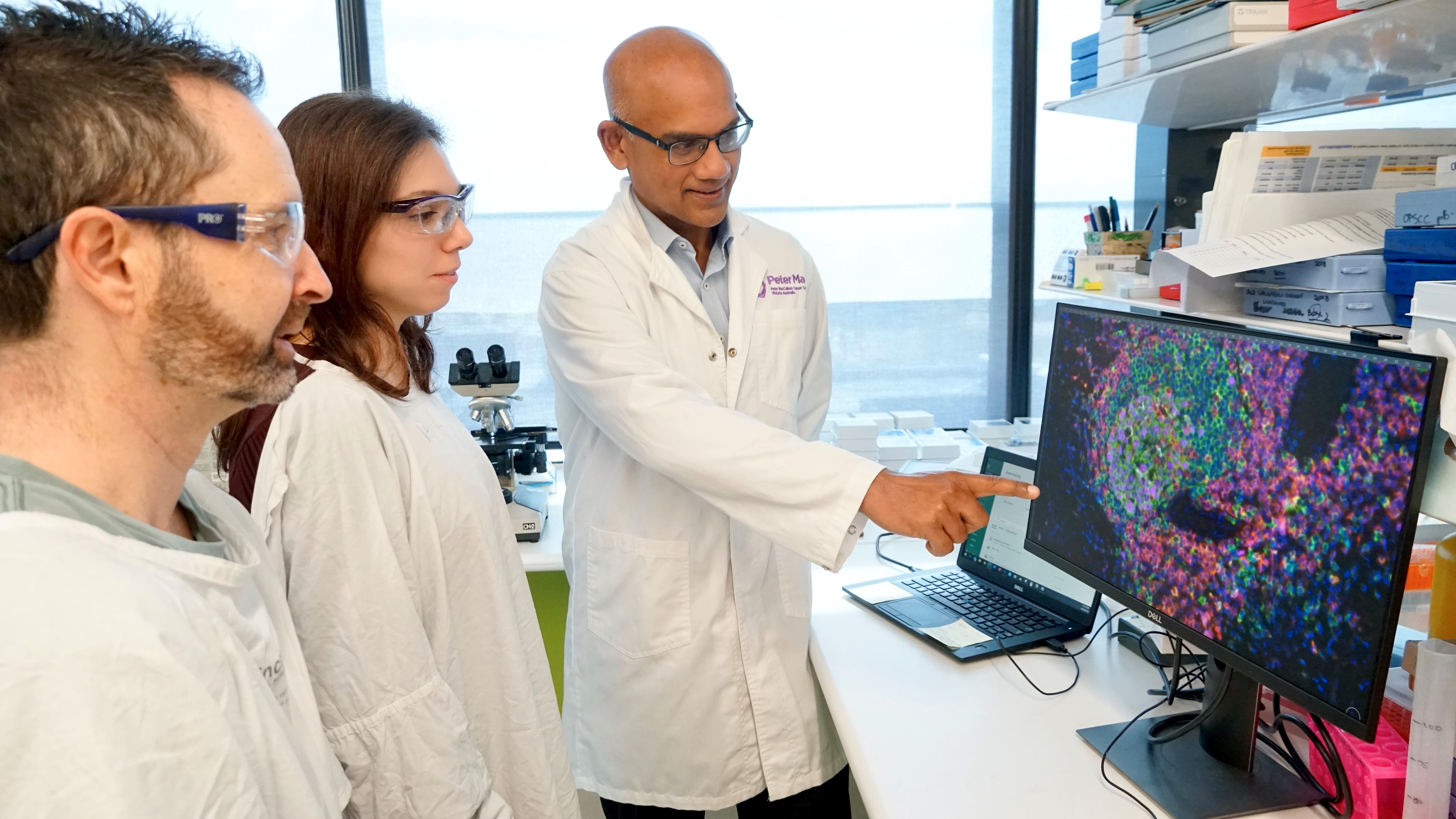
Professor Ben Solomon, researcher and medical oncologist at Peter Mac, worked on Chris's case.
Personalised treatment at Peter Mac
A week after being admitted to RMH, Chris was moved across the road to Peter Mac and into the care of Professor Ben Solomon and colleagues.
"A biopsy of Chris’s cancer was taken and used to personalise his treatment by specifically targeting a change in the DNA of the tumour", Prof Solomon explains.
What we found in Chris's cancer was something called an ALK mutation. This mutation meant that there was something in the cancer cells making them continue to grow – like a switch stuck in the ‘on’ position.
When the ALK gene mutation was discovered in lung cancers in 2007, Prof Solomon had been involved in trials of drugs to block it. He had seen ALK work as a switch, telling the lung cancer to grow. But if you used a drug to block it, the signal turned off and the lung cancer shrank.
Though approved and funded for lung cancer, there was little evidence to back the drug's use for another disease such as Chris’s cholangiocarcinoma. But, with the genes responsible for a cancer emerging as potentially more important than the organ or area of the body it starts in, Prof Solomon was convinced to take the one in a million chance.
"Chris's life expectancy would have been measured in days at that point. But, once we started the treatment, his condition stabilised. He needed less and less in the way of blood products."
Another week passed and Chris underwent another PET scan to see if the experimental treatment had had any impact on his cholangiocarcinoma.
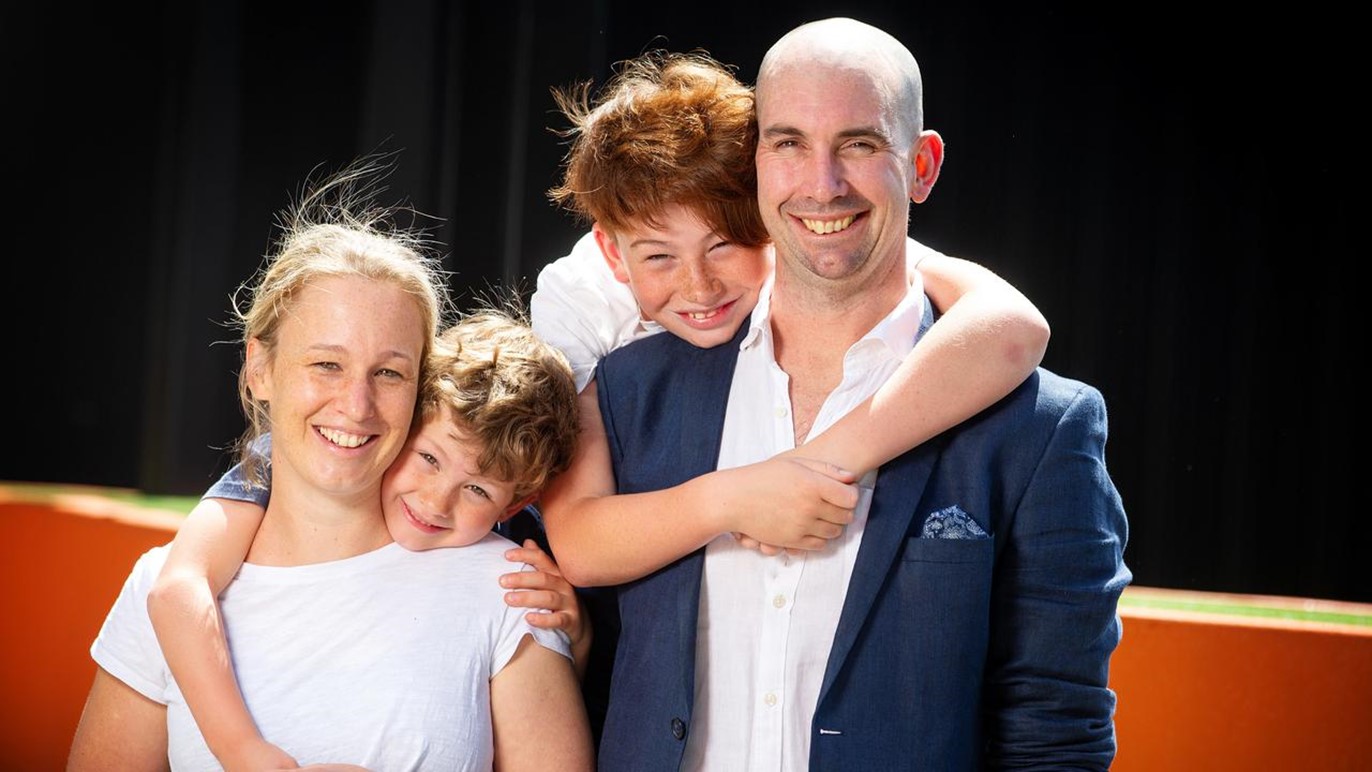
Chris with wife Kath and sons Tom, 6, and Miles, 9. [Photo credit: Mark Stewart]
It was October 24, but it was still believed Chris would struggle to see November.
As results from the scan emerged they were checked and then double checked by several oncologists to make sure they were of the correct patient, before Chris was summoned.
“The PET scan showed an amazing response — the tumour that had been on was turned off,” Prof Solomon said. “Saying the response was spectacular would be an understatement.”
Areas that had been completely taken over by tumours in Chris’s first scans now showed no signs of active tumours — meaning they were likely to shrink.
“To have come out of a scan and not have it be imminent death was startling,” Chris said. “I wanted to get to another kids’ sporting commitment — at that moment it became feasible that I might get out of hospital.”
In the middle of his under-10s basketball game in Altona the following afternoon, Tom was shocked to see his biggest fan shuffle into the stadium, sit down beside the court and cheer him. When the game was done Chris, Kath and Tom drove down the road, parked beside an oval and watched an equally surprised Miles play cricket.
Despite having said goodbye to his sons three times in the past fortnight, Chris was again courtside watching Miles’ basketball the next morning, celebrating an uncertain but hopeful future.
When I was in hospital I thought I would never get to see them play footy or cricket or basketball again. So, to get there and do those things, that was just magical.
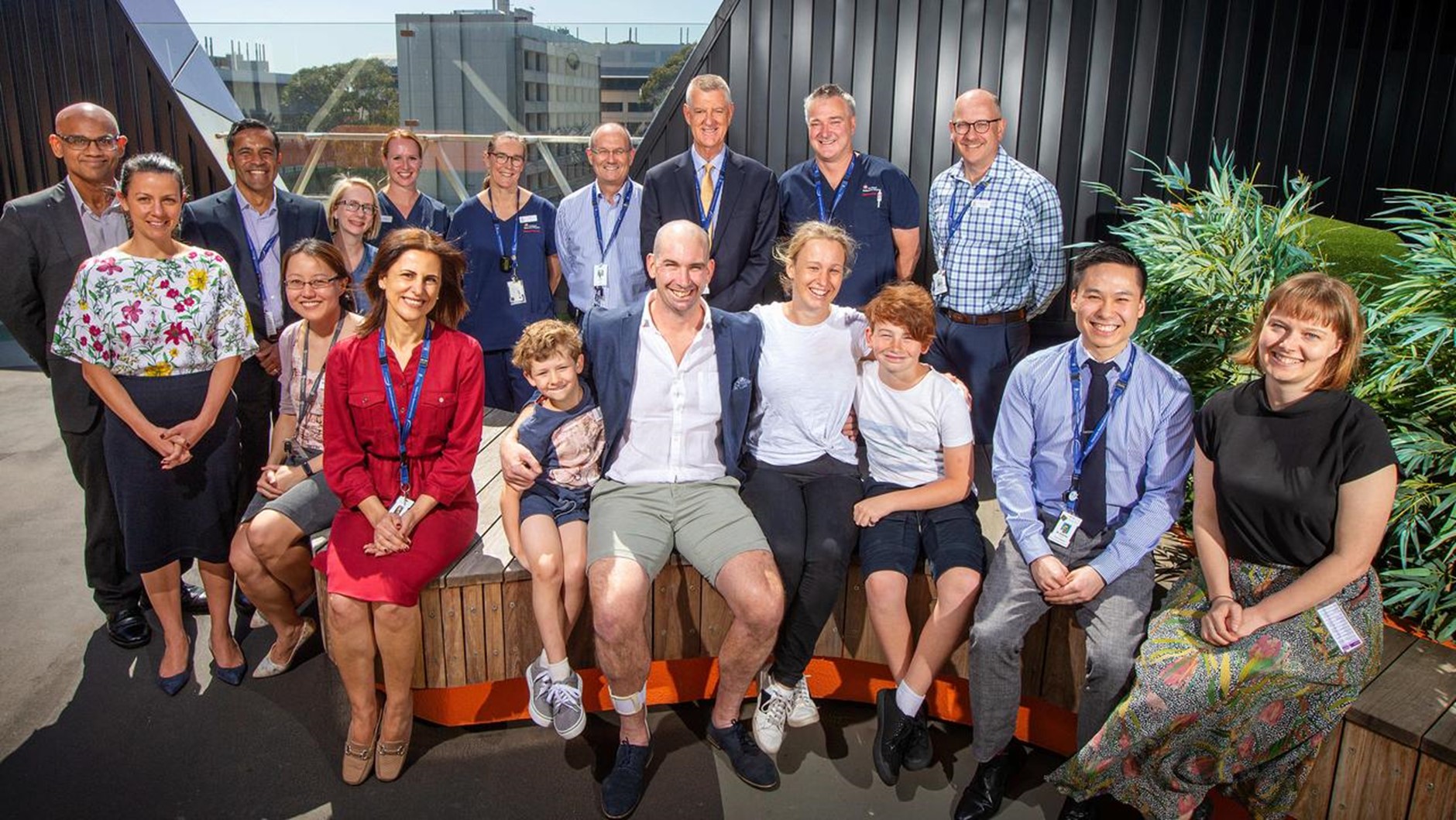 Chris surrounded by his loved ones, and his medical team from Royal Melbourne Hospital and Peter Mac
Chris surrounded by his loved ones, and his medical team from Royal Melbourne Hospital and Peter Mac
How you can help
Cancer research has spared Chris’s life once, but further research is crucial to discovering the cure he needs. Tumours can evolve to become immune to drugs, so Chris’s medium and long-term future remains unknown.
"Chris’s cancer is very much still there – it’s just dormant" Prof Solomon says.
Today, Professor Solomon is investigating how people like Chris become resistant to their cancer medications – something that is a real risk to Chris’s life. Chris’s treatment is currently keeping his cancer at bay, but there’s no knowing how long that will last.
By researching how resistance to treatment develops, Professor Solomon is aiming to discover ways to overcome this and eventually, discover new cures.
"Cancer is unscrupulous. It doesn't discriminate on any level. And I have seen how quickly and how devastatingly it can do that" says Chris.
It would appear to me that my cancer may not yet be able to be defeated. But we can certainly take up the fight. And the best way that you can do that is through cancer research.
Donate today to help Peter Mac researchers discover live-saving cures for people like Chris.
@Follow us on Instagram (@SupportPeterMac)

